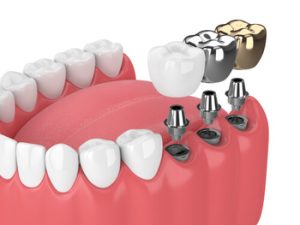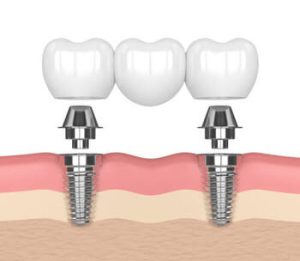When you lose a tooth or several teeth, you are faced with a choice: should you opt for dental implants or a dental bridge? Both solutions are designed to replace missing teeth but have different advantages and drawbacks. This article will unveil the differences between these two options and why dental implants are often considered the superior solution for long-term dental health and appearance. By the end, you’ll understand which option might be best for you, especially if you’re trying to restore your natural smile.
What Are Dental Implants and Dental Bridges?
Before we dive into the comparison between dental implants and bridges, let’s get a better understanding of each option.
Dental Implants: A Permanent Solution

Dental Bridges: A Traditional Option
A dental bridge is a type of restoration designed to fill the space left by one missing tooth or more. It typically involves placing crowns on the adjacent teeth (called abutment teeth) to anchor the bridge. The bridge is made up of a false tooth (or multiple false teeth) that “bridges” the gap created from missing a tooth or teeth.
The Key Difference
The major difference between these two treatments is that dental bridges rely on surrounding teeth for support, whereas dental implants are anchored directly into the jawbone. This difference has significant implications for oral health and the longevity of the solution.
Why Choose Dental Implants Over Bridges?
Let’s examine why dental implants are the preferred choice, especially compared to dental bridges.
Preserving Healthy Teeth
One of the major benefits of dental implants is that they do not require any alteration to your existing teeth. With a dental bridge, the adjacent healthy teeth need to be shaved down to accommodate the dental crowns that will support the bridge. This can weaken otherwise healthy teeth, making them more susceptible to damage over time.
Dental implants stand independently without impacting neighbouring teeth, making them a better option for long-term dental health.
Preventing Bone Loss
When you lose a tooth, the jawbone in the empty socket begins to deteriorate because it no longer receives stimulation from chewing. Over time, this can cause bone loss and a change in the structure of your face.
Dental implants fuse with the jawbone and stimulate bone growth, preventing the loss of bone density. On the other hand, a dental bridge sits on top of the gum line and does nothing to preserve the underlying bone, which may lead to bone deterioration over time.
Longevity and Durability
With the right care, dental implants can endure a lifetime, making them a highly durable solution for replacing missing teeth. In contrast, a dental bridge typically lasts between 10 to 15 years before its replacement.
Although dental bridges are effective in the short term, implants are the more durable and long-lasting option. With proper care, your dental implant will continue to provide you with a natural appearance and function for many years to come.
Natural Appearance and Function
Dental implants closely resemble and perform like natural teeth. The prosthetic tooth attached to the implant integrates smoothly with your surrounding teeth. On the other hand, a dental bridge may appear less natural because it is supported by the neighbouring teeth.
If you’re looking for a solution that will feel as close to your natural tooth as possible, dental implants offer the best natural appearance and function.
Reduced Risk of Further Tooth Loss
With a dental bridge, there is a risk of further tooth loss because the bridge relies on the surrounding teeth for support. If one of the abutment teeth fails, the entire bridge could need to be replaced. This isn’t an issue with dental implants, as they are self-supporting and do not depend on neighbouring teeth.
By choosing dental implants, you can protect your healthy teeth and lower the risk of future dental problems.
The Dental Implant Procedure: What to Expect
If you’re considering dental implants, it’s important to understand that it is a more involved procedure than getting a dental bridge. However, the long-term outcome often outweighs the initial time and effort required. Here’s a step-by-step look at the process:
- Consultation with Your Dental Professional: Your dentist will examine your dental health and determine if you’re a suitable candidate for dental implants. They will assess factors such as your jaw bone density and overall oral health.
- Dental Implant Surgery: During this oral surgery, the tooth implant is placed into the jawbone. This requires local anaesthesia, and some patients may also need bone grafting if there isn’t enough bone to support the implant.
- Healing Period: The implant needs time to blend with the surrounding bone, a process called osseointegration, which typically takes several months.
- Placement of the Prosthetic Tooth: Once the implant has healed, a dental crown (or prosthetic tooth) is placed on top of the implant to complete the procedure.
While the process can take several months, the result is a permanent solution that will last for many years and, in many cases, a lifetime.
Cost Considerations: Dental Implants vs Bridges
One of the main concerns for patients is the cost of dental implants. It’s true that dental implants are more expensive upfront than dental bridges. The cost of dental implants is variable according to several factors, like the number of teeth being replaced, the need for bone grafting, and the complexity of the surgery. However, the long-term benefits often justify the higher cost.
While dental bridges may be cheaper in the short term, they often need to be replaced or repaired, and the impact on your adjacent teeth can result in additional dental problems and expenses down the line. In contrast, dental implants are a long-term investment that, with adequate care, can offer lifelong benefits.
The Health Benefits of Dental Implants
Beyond their aesthetic and functional benefits, dental implants also provide a variety of health advantages:
- Enhanced Oral Health: Dental implants support healthy teeth and preserve the jawbone, contributing to better overall dental health.
- Prevention of Gum Disease: The spaces left by missing teeth can create ideal environments for bacteria to accumulate, raising the risk of gum disease. By filling these gaps with tooth implants, you can reduce your risk of gum issues.
- Better Jaw Alignment: When you lose a tooth, the remaining teeth can move out of place, leading to bite issues and discomfort. Dental implants help keep your teeth aligned, supporting better jaw function.
Dental Bridges: Are There Any Advantages?

- Quicker Treatment Time: If you need a solution quickly, a dental bridge can often be completed in just a few visits, whereas dental implants require several months of healing.
- No Surgery Required: For individuals who are not suitable candidates for surgery or prefer to avoid it for any reason, a dental bridge provides a non-surgical alternative.
However, it’s important to weigh these short-term benefits against the long-term advantages of dental implants, especially when considering the impact on your oral health.
FAQs: Dental Implants vs Bridges
- What is the duration of a dental implant procedure?
The full process of receiving a dental implant can span several months. Following the initial surgery to insert the implant, it generally requires 3 to 6 months for the implant to bond with the jawbone. After the healing phase is finished, a dental crown is placed, finalising the procedure.
- Do dental implants cause pain?
The procedure is performed under local anaesthesia, so you should feel comfortable during the surgery. After the procedure, some discomfort is common during the healing process, but it can be managed with over-the-counter pain relievers. Your dentist will give specific aftercare instructions to ensure a smooth recovery.
- Can anyone get a dental implant?
Most individuals in good overall health with adequate jawbone density are typically good candidates for dental implants. However, people with certain medical conditions, like uncontrolled diabetes, or those who are heavy smokers may not be ideal candidates. Consulting with your dentist will help determine if implants are a suitable option for you.
- What is the proper way to care for my dental implant?
Dental implants demand the same care like your natural teeth—brushing twice a day, flossing, and regular dental check-ups are essential. With good oral hygiene and good care, dental implants can last for decades.
- What happens if I don’t have enough bone for a dental implant?
If you don’t have enough bone to support a dental implant, your dentist may recommend a bone grafting procedure to add more bone. This will help provide a solid foundation for the implant.
- How long does a dental bridge last?
A dental bridge typically lasts 10 to 15 years, depending on how well you care for your teeth and gums. Routine dental visits for check-ups and proper oral hygiene are important to extend the life of your bridge.
- Can a dental bridge be replaced with a dental implant later on?
Yes, if your dental bridge fails or if you’re looking for a more permanent solution, it can be replaced with a dental implant. However, your dentist will evaluate the condition of your jawbone and oral health to determine if an implant is feasible.
- What are the risks of getting a dental implant?
Like any surgical procedure, dental implants carry some risks, such as infection, nerve damage, and sinus complications. However, these risks are generally low, and any issues can typically be managed. Your dentist will review these potential risks with you before the procedure.
- How do I decide between a dental implant and a bridge?
Deciding between a dental implant and a dental bridge depends on various factors, such as your overall oral health, the condition of your surrounding teeth, and your personal preferences. Your dentist will help guide you through the decision-making process, considering your specific needs.
- Is a dental implant more expensive than a bridge?
Yes, dental implants typically have a higher upfront cost than dental bridges. Still, they are more durable and last significantly longer, making them a cost-effective solution in the long term.
Final Verdict: Why Dental Implants Offer the Best Solution

If you’re exploring options for replacing missing teeth, it’s important to consult with our experienced dental professional. They can guide you through choosing between a dental implant or bridge, helping you make the best decision for your smile and long-term oral health. For expert advice, contact Cross Road Dental at (08) 8004 5137.
Note: Any surgical or invasive procedure carries risks. Before proceeding, you should seek a second opinion from an appropriately qualified health practitioner.
References:
Cleveland Clinic. (n.d.). Dental implants. Cleveland Clinic. https://my.clevelandclinic.org/health/treatments/10903-dental-implants
WebMD. (n.d.). Dental health and bridges. WebMD. https://www.webmd.com/oral-health/dental-health-bridges
Colgate. (n.d.). What is good oral hygiene? Colgate. https://www.colgate.com/en-us/oral-health/adult-oral-care/what-is-good-oral-hygiene
Karlsson, S. (1986). Failure of dental bridges. II. Prevalence of failure and its relation to place of construction. Journal of Oral Rehabilitation, 13(5), 447–452. https://pubmed.ncbi.nlm.nih.gov/8809699/

